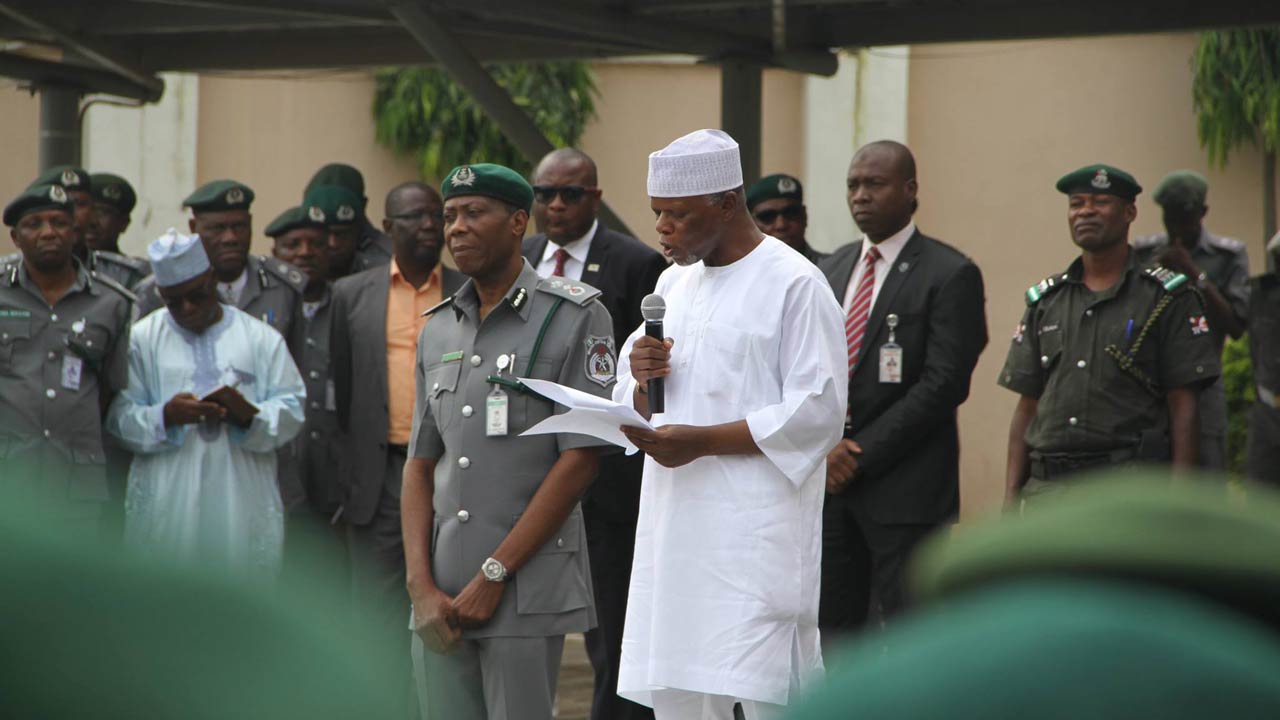- Beyond Customs 2017 record N1 trillion revenue
The Nigeria Customs Service generated a record N1.37 trillion in 2017. The feat was achieved against the background of the recession that ravaged the economy from mid-2014 until the third quarter of last year, and the foreign exchange policy that barred 41 import items from benefiting from the official window in 2016. In a statement, the NCS Public Relations Officer, Joseph Attah, explained that dogged implementation of the presidential mandate to the Comptroller-General, Hameed Ali, to restructure, reform, and raise revenue was the magic wand. The Federal Government had set N770.57 billion revenue target for it.
The NCS generated N898.67 billion in 2016 with an average exchange rate of N305.1; N903 billion in 2015 at an average exchange rate of N196.9 and N977.09bn in 2014 at a N164.6 rate. Taking the exchange rate instability into consideration, it is hard to credit the 2017 figure to any remarkable reform measures. Though the NCS had sacked 29 senior officials, among them four deputy-controllers and five assistant comptrollers, and thrown out 17 junior officers for various offences, the Service is overdue for branch and root reform.
The inadequate deployment of cutting-edge technology in its operations fuels corruption at the Apapa and Tin Can Island seaports in Lagos as well as the Port Harcourt, Warri and Calabar ports as cargoes are physically inspected, instead of using scanners. Smuggling cannot be contained under these circumstances. It also fosters delay for importers and exporters, thus making the ports unattractive for business. New scanners imported by the NCS are expected to arrive in the first quarter of this year, the Controller, Federal Operations Unit, Zone “A”, Mohammed Garba, said last October. Existing scanners had collapsed since 2014/2015. Perhaps, it is only in Nigeria this happens.
More than anything else, the NCS’s N1 trillion revenue mark exposes its underbelly. In his first meeting with the management of the service in September 2015, Ali explained that his mandate was headlined by transformation. Whatever he has done so far in line with public expectation has yet to deepen. To achieve the expected goal, high-tech or automation should define its operations. This invariably reduces the degree of physical contact that fuels graft. It was this concern, among others, that prompted Michael Ivenso, a maritime consultant, to say in 2014, “Nigeria is losing $16 billion annually for not doing what it ought to do at the ports.” It is with 100 per cent digital telecommunications network and extensive roads and rail networks that Dutch ports handle 500 million metric tons of cargoes annually. Singapore is another global model where customs operations are technology-driven.
Ali’s report card shows that the NCS needs a shot in the arm. A leadership with integrity is critical in all of the country’s revenue generating agencies. It is a fact that the Registrar of the Joint Admissions and Matriculation Board, Ishaq Oloyede, showed with the N7.8 billion his agency remitted to government coffers in 2017, as against the N3 million annually remitted by his predecessors. John Atte’s brief tenure as the Acting CGC, inadvertently revealed that corrupt officials enrich their pockets more than the Federation Account, as average monthly revenue spiked from N13 billion to N35 billion. This was after he held discussions with the area comptrollers.
Corruption in Customs blocks economic development. It has helped to kill the textiles and poultry industries as smugglers run riot. Textiles from China worth N315 billion were discovered in 75 warehouses in Kano in 2015. Similarly, Ayoola Oduntan, proprietor of Amo Farms in Oyo State, says contraband account for 75 per cent of frozen chicken in the country, to the detriment of about N2.5 billion worth of locally produced ones in cold rooms. As our seaports are compromised, the land borders are even more. Only an effective manning of them, identifying the bad eggs in Customs and showing them the way out, can bring this scourge under control.
We need to design a comprehensive strategy for the control of our borders. A presidential Task Force under Dikko’s leadership carried out a superficial reform, including the automation of goods clearing in 2009, recruited 5,000 in 2009 and 2,800 in July 2011; purchased 400 operational vehicles and reduced abuse of ECOWAS Trade Liberalisation Scheme with visits to factories in member countries to ascertain eligibility of products. The Federal Government should go the whole hog. After the terror attacks of September 11, 2001 in the United States, the government announced a new border patrol strategy. It consists of six core elements: securing the right combination of personnel, technology and infrastructure; improving mobility and rapid deployment to quickly counter and interdict based on shifts in smuggling routes and tactical intelligence; deploying defence-in-depth that makes full use of interior checkpoints and enforcement operations calculated to deny successful migration; coordinating and partnering with other law enforcement agencies to achieve set goals; improving border awareness and intelligence; and strengthening the headquarters command structure. Manning Nigeria’s porous borders and ports demands a new strategy, too.
While improved revenue collection is critical, even more is the imperative of protecting local industries so that jobs could be created for the teeming unemployed. Smugglers should be stopped in their tracks. The NCS knows all their routes. As of 2013, the textile industry had 24,000 jobs left out of the 800,000 it used to provide, a former Minister of State for Trade and Investment, Samuel Ortom, said then. But a shift from Customs’ old and warped operations is impossible without a motivated workforce. Many of its officers complain of poor remuneration. This should be addressed quickly.

 Naira4 weeks ago
Naira4 weeks ago


 Naira4 weeks ago
Naira4 weeks ago




 Naira4 weeks ago
Naira4 weeks ago
 Commodities4 weeks ago
Commodities4 weeks ago




 Naira3 weeks ago
Naira3 weeks ago


 News4 weeks ago
News4 weeks ago
 Travel4 weeks ago
Travel4 weeks ago




 Naira3 weeks ago
Naira3 weeks ago






















